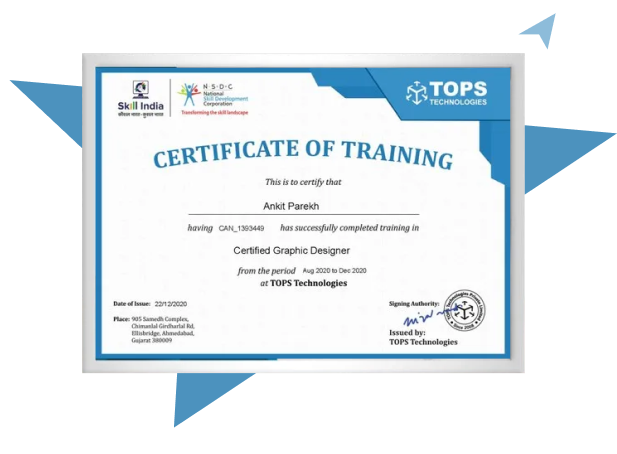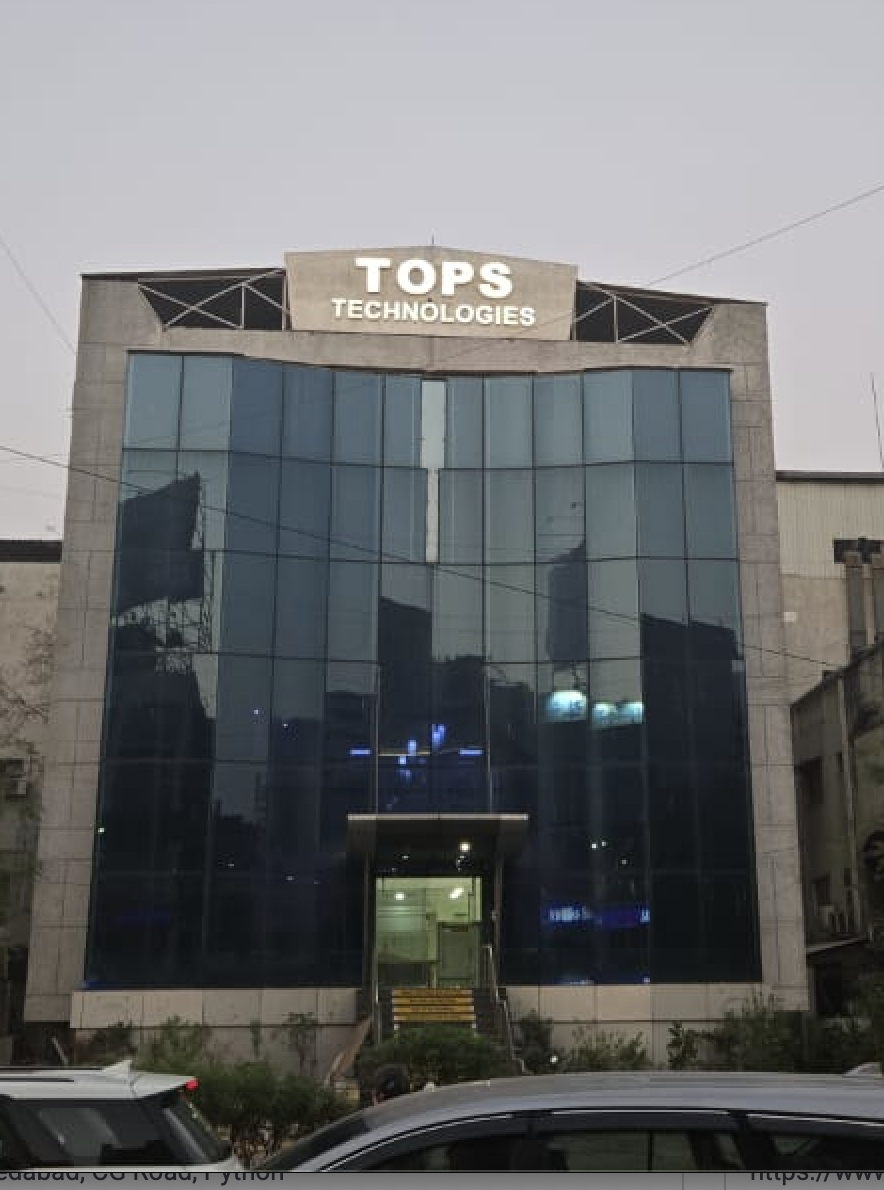Our Facts and Figures
1 Lac+
Student Placed
3000+
Companies TieUp
19+
Offices in India
50+
Industry Courses
Get 100% Job Assistance by enrolling in Certified Java Training Course
Key Highlights
Limited Students Batch
Personalised Attention
Highly Qualified Teachers
Flexible Batch Timings
Interactive Learning
Live Projects
Career Support
Job Oriented Training
Java Course Highlights
Master Java with TOPS Technologies – The Best Java Training Institute in Rajkot
Java remains one of the most in-demand programming languages, powering everything from mobile applications to enterprise-level cloud computing. According to recent studies, Java-based software demand has surged by 31%, leading to an increase in developer salaries. If you want to build a successful career in software development, enrolling in a Java Course in Rajkot at TOPS Technologies is the right step forward.
Our Java Training in Rajkot equips students and professionals with hands-on skills to develop powerful applications and become job-ready. A Java Certification from TOPS Technologies adds credibility to your resume and enhances your career prospects.
Why Choose Java Training?
Java is a robust, object-oriented programming language developed by James Gosling at Sun Microsystems in 1995. It enables developers to build secure, high-performance applications across various platforms. Java is widely used in web development, mobile applications, cloud computing, and enterprise software.
Key components of Java include:
Java Virtual Machine (JVM) – Allows Java applications to run on any device or operating system.
Java Application Programming Interface (API) – A comprehensive set of libraries for developers.
Java Development Kit (JDK) – Essential tools for Java programming, testing, and deployment.
Key Benefits of Our Java Course in Rajkot
1. Frequent Updates & Industry Relevance
Java consistently evolves to meet industry needs, with updates every six months. Its advancements in microservices, cloud computing, and AI-driven applications make it a preferred choice among developers.
2. Enhanced Security Features
Security is a top priority for developers. Java's built-in security features, including memory management and runtime checking, make it one of the safest languages for software development.
3. Platform Independence
Write your code once and run it anywhere! Java’s platform-independent nature allows programs to execute seamlessly across multiple operating systems.
4. Strong Developer Community
With millions of developers worldwide, Java boasts an active and supportive community. Platforms like Stack Overflow, GitHub, and Java forums offer extensive learning resources and troubleshooting support.
Java Training in Rajkot – Who Should Enroll?
Our Java Classes in Rajkot are designed for:
Beginners looking to start a programming career.
Working professionals seeking career advancement in software development.
Entrepreneurs aiming to develop their own Java-based applications.
Students pursuing IT degrees who want hands-on Java experience.
No prior coding experience is required! Our structured Java Programming Course ensures step-by-step learning, from basic to advanced Java development.
Java Job Roles & Salary Insights
With Java expertise, you can explore lucrative job roles such as:
Java Developer – Designs, develops, and maintains Java applications.
Salary: Up to ₹9 LPA in Rajkot.
Web Developer – Builds dynamic websites using Java, HTML, CSS, and JavaScript.
Salary: Up to ₹8 LPA in Rajkot.
Systems Administrator – Manages IT infrastructure, ensuring system security and efficiency.
Salary: Up to ₹8 LPA in Rajkot.
Database Administrator – Maintains databases for seamless data storage and retrieval.
Salary: Up to ₹7 LPA in Rajkot.
Industries That Rely on Java
Java is a critical technology in multiple industries:
Finance – Banks and fintech companies use Java for transaction management.
Healthcare – Hospitals and medical firms use Java for patient data management.
Retail – E-commerce platforms and CRM applications rely on Java for smooth operations.
Enroll in the Best Java Training in Rajkot
Rajkot is a booming IT hub with numerous career opportunities in software development. TOPS Technologies offers comprehensive Java Training in Rajkot with:
Expert-Led Java Classes – Learn from industry professionals.
Hands-On Learning – Work on real-world projects and case studies.
Java Certification – Boost your job prospects with a recognized certification.
Placement Assistance – Get job support with top IT companies in Rajkot.
Experience a Free Demo Session!
Visit the TOPS Technologies Rajkot Training Center to explore how our Java Classes in Rajkot can transform your career. Book your free demo session today!
40%
Average Salary Hike
4.5 Lacs
Highest Salary
3000+
Hiring Partners
Join Our Free Upcoming Webinar
Skills you need to Become an Expert Data Analyst
11 Jul 2025, 02:00 PM
Trainer
Rahul Sanghavi CG
(Sr. Technical Trainer)
Learn the Website Hacks and Provide Better Security
11 Jul 2025, 03:30 PM
Trainer
Faruk Pathan
(Sr. Technical Trainer)
Motion Graphics and Animation in Design
11 Jul 2025, 05:00 PM
Trainer
Parth Patel
(Sr. Technical Trainer)
All About Full Stack Development
12 Jul 2025, 10:30 AM
Trainer
Anjali Patel
(Sr. Technical Trainer)
How to Create a Live Website + Internship
12 Jul 2025, 12:00 PM
Trainer
Anjali Patel
(Sr. Technical Trainer)
From Data to Decisions : AI in Smart Industries
12 Jul 2025, 02:00 PM
Trainer
Bhaumik Vyas
(Sr. Technical Trainer)
Career in Digital Marketing
12 Jul 2025, 04:30 PM
Trainer
Sanket Chauhan
(Sr. Technical Trainer)
Android UI Design with Kotlin
13 Jul 2025, 11:00 AM
Trainer
Prakruti Vyas
(Sr. Technical Trainer)
Java Course Curriculum
Download Curriculum- Introduction to Java
- Introduction of Students Career in IT
- Working on Project and Assignment Using Lab
- Conditional Statements (If, If Else, Nested If Else If) (Switch Case)
- Loops (While, Do While, For)
- Break and Continue
- SDLC Process
- Project Analysis
- Analysis In Details
- DFD(with practical)
- Introduction of DFD
- Rules for Drawing DFD
- Context Level
- First Level
- Second Level
- Data Dictionary
- Flow Chart
- Data Dictionary
- Flow Chart
- Introduction of Core Java
- Eclipse IDE
- JVM,JDK,JRE
- Class, Object, Method
- Constructor
- Garbage Collection
- Finalize
- Source File Layout
- Package Management
- Import Statement
- Data types
- Primitive Types
- Reference Types
- Modifiers- Public, Private, Protected, Default
- Conditional Statements and Looping Statements
- Array Introduction
- Why Array? Advantages
- Types of Array
- Resizing Array
- Copying Array
- Primitive types and Reference type Arrays
- Encapsulations
- Inheritance – Introduction
- Advantages of Inheritance
- Types of Inheritance
- Practical of Inheritance
- Practical of Inheritance with Constructor
- Polymorphism
- Types of Polymorphism
- Method Overloading and Method Overriding
- Abstract and Interface – Introduction and Difference
- Keywords – This, Static, Final, Super
- Classes
- Object Class(only Important Methods)
- String Class (Only Important Methods)
- String Buffer & String Builder
- Wrapper Classes
- Exceptions
- Introduction – Why Exceptions
- Types of Exceptions
- Try catch and Finally Block
- Multi-catch Exceptions
- Throw and Throws keywords
- Method Overriding with Exceptions
- Custom Exceptions
- FILE I/O
- What is Stream and Types of Stream
- File Input Output Streams and Its Methods
- File class
- Command Line Arguments
- Thread-Introduction
- Thread Life Cycle
- Creating Threads
- Thread Class Methods (Only Important Methods)
- Runnable Interface
- Synchronized block and Synchronized Methods
- Collection Framework – Introduction
- Collection API
- Hierarchy of Collections
- List and Set and Map Collections
- Array list, vector, and Other Classes
- Generics
- Comparator and Comparables
- JAVA GUI
- AWT (Introduction only) & Swing (in Details)
- Components, Containers, Frame, Window, Panel, Layout
- All Components
- Events, Event Handling
- Database
- DDMS and RDBMS
- Introduction
- MYSQL
- MYSQL IDE
- Query Types
- DDL,DML,DQL, DCL
- Constraints
- Primary Key
- Foreign Key
- Unique Key
- Normalizations
- 1NF
- 2NF
- 3NF
- Joins
- All Joins Types
- Advance Database
- Indexers
- Views
- Procedures
- Functions
- Cursor
- Triggers
- JDBC (Insert, Update, Select, Delete)
- Introduction of JDBC
- Driver Types
- Steps for Creating Connections
- Types of Statements (Statements, prepared Statements and Callable Statements)
- Result Set Interface
- Database Metadata
- Result Set Metadata
- HTML
- UL Tag
- LI Tag
- a Tag
- IMG tag
- Table, TR, TD tag
- Form tags with Attributes
- All input tags
- CSS
- Types of CSS
- Pseudo- Classes
- Margins and Puddings
- CSS background
- CSS using ID and Class
- JavaScript
- Events
- Validations
- Validations with Regular Expressions
- Firebug
- Template Integration
- Introduction of Client-Server Architecture
- HTTP Protocol overview with Request and Response header explanation
- J2EE Architecture Overview
- Web Component Development In Java
- CGI Programming Process Advantage and Disadvantage
- Servlet Programming Introductions
- Advantage and Disadvantage
- Servlet Versions
- Types of Servlets
- Difference between HTTP Servlet a Generic Servlet
- Servlet Life Cycle
- Creating Servlets
- Servlet Entry in web.xml
- Logical URL
- Servlet Config Interface
- Request Dispatcher Interface
- Forward and Include Methods
- Servlet Context Interface
- Web Application Listener
- Scope of Objects, Request, and Response
- Application (Context) , Config
- Java Filters – Introduction
- What are the needs
- Filter Life Cycle
- Process of Execution Filter
- Applying Filter
- Entry in web.xml
- URL Pattern with Filter
- JSP Introduction
- JSP Translation
- JSP Life Cycle
- Comments
- Directives
- Scrip lets
- Expression
- Declaration
- Implicit Objects
- Action
- JSTL
- Custom Tags
- Session Management – Introduction
- What are the needs?
- Session Tracking Technique
- Hidden Form Fields
- URL Rewriting
- Cookies
- Session
- Design Pattern
- MVC Design Pattern with Example
- AJAX Programming With Example
- Introduction to Distributed Technologies
- RMI, EJB and WEB Services Introduction
- Types of web services
- What is Restful Web Services?
- Restful Web Services Annotations
- Restful Web Services with Example
- Hibernate Introduction
- Hibernate Architecture
- Hibernate Configuration
- All Core Interface
- Query and Criteria
- Named Query
- All Relationships
- One to One
- One to Many
- Many to One
- Many to Many
- All Database Operations with hibernate
- Overview Of Spring Framework
- Introduction of Spring Framework Architecture
- Core Container
- AOP (Aspect Oriented Programming)
- Spring DAO (Data Integration)
- Web
- Spring Using IDE
- Using Library
- Spring Hello World Example
- Spring IOC Container
- Bean Factory
- Application Context
- Spring Bean Definition
- Configuration
- Life Cycle
- Inheritance
- Scopes
- Spring Dependency Injection
- Constructor-based
- Setter Getter based
- Inner Beans, Aliases, and ID-ref
- Collections and References
- Auto Wiring
- Spring AOP
- AOP Term
- Write the Aspects
- Configure Where the Aspects
- Spring ORM
- Spring MVC Web Forms
- Spring Form Handling
- Spring Form Tags
- Spring Controller XML and Annotation Based
- Spring MVC with Session Management
- Spring CRUD Operation using Hibernate ORM
- Cloud Computing – Introduction
- Types
- Hosting
- The Project Definition for this Java Live Project was an Online News Portal. It allows the News publisher to publish his news and the user can select the news he wants to read. The project was developed using cutting edge technology in Java using advance
- This Live project was rated as the best java project ideas was built in Java and allows a user to find cheap and efficient parking in and around where the user is. The system using gps tracking on the mobile phone and finds the most effective parking spot
- This Java Project was built for the government java course admission process. The student Management system allows the tracking of all the students, their daily attendance, Java Classes, Java Certification grades. All the information about Java Training i
Our TOPS Training Centers in India
Course Key Features
- Complete Learning Path – Covers fundamental to advanced concepts, including Core Java, Object-Oriented Programming (OOP), and Java frameworks like Spring and Hibernate.
- Practical Hands-on Experience – Focus on real-world applications with coding exercises, mini-projects, and live assignments.
- Object-Oriented Programming Mastery – Deep dive into OOP principles, design patterns, and reusable coding techniques.
- Database Connectivity – Learn how to integrate Java applications with databases using JDBC and SQL.
- Multithreading & Performance Optimization – Develop efficient applications with threading, synchronization, and concurrent programming.
- Web Application Development – Work on JSP, Servlets, and Spring Boot to create scalable and dynamic web applications.
- API Development & Web Services – Learn to build and consume RESTful APIs using Java.
- Debugging & Testing Strategies – Enhance code quality with debugging techniques, unit testing (JUnit), and industry best practices.
- Capstone Projects & Industry Exposure – Build real-world projects to strengthen practical skills and gain hands-on experience.
- Career Support & Placement Guidance – Get assistance with interview preparation, resume building, and job opportunities in the software industry.
Skills Covered
- Advanced Java Concepts – Gain expertise in Java 8+ features, including lambda expressions, functional programming, and the Stream API.
- Collections & Data Structures – Master working with Lists, Sets, Maps, and Queues for efficient data management.
- Exception Handling & Debugging – Learn how to manage runtime errors using custom exceptions and effective debugging techniques.
- Multithreading & Concurrency – Develop high-performance applications using thread management, synchronization, and parallel processing.
- Database Connectivity with JDBC – Integrate Java applications with relational databases like MySQL and PostgreSQL.
- Building Web Applications – Learn Servlet and JSP technologies to create interactive web pages.
- Spring Framework – Work with Spring Boot, Spring MVC, and Spring Security to develop scalable applications.
- Hibernate & ORM – Use Hibernate to simplify database operations with Object-Relational Mapping (ORM).
- RESTful API Development – Build and consume RESTful web services using Spring Boot and JAX-RS.
- Microservices Architecture – Explore the fundamentals of microservices, API gateways, and service communication.
- Software Testing – Implement unit testing using JUnit and Mockito to ensure code reliability.
- Maven & Project Management – Automate build processes and manage dependencies efficiently with Maven.
- Application Security – Learn authentication, authorization, and encryption techniques for secure applications.
- Cloud Deployment – Deploy Java applications on cloud platforms like AWS, Google Cloud, or Azure.
- Design Patterns & Best Practices – Apply coding standards, SOLID principles, and design patterns for maintainable code.
Job Roles
- Java Developer – Design and build applications using Java for various business needs.
- Software Engineer – Develop software solutions, troubleshoot issues, and optimize performance using Java.
- Backend Developer – Focus on server-side logic, database integration, and API development.
- Full-Stack Developer – Work on both frontend and backend technologies, combining Java with web development frameworks.
- Android App Developer – Create mobile applications using Java and Android SDK.
- Web Developer – Develop web-based applications using Java technologies like Servlets, JSP, and Spring Boot.
- Cloud Application Developer – Build and deploy Java applications on cloud platforms such as AWS, Azure, or Google Cloud.
- Microservices Engineer – Develop and maintain microservices-based applications using Java frameworks like Spring Boot.
- DevOps Engineer – Use Java in automation, continuous integration, and deployment processes.
- Automation Test Engineer – Perform software testing using Java-powered tools like Selenium.
- Game Developer – Create interactive applications and games using Java frameworks such as LibGDX.
- Data Engineer – Work with data processing and analytics using Java for big data technologies.
- AI & Machine Learning Engineer – Utilize Java for AI and ML applications with frameworks like Weka or Deeplearning4j.
- Technical Support Specialist – Assist in troubleshooting, debugging, and optimizing Java-based software.
- Freelancer or Entrepreneur – Work independently by developing Java applications or offering development services.
Get Training Certificate by Government
Recognized NSDC/Skill India

- National Skill Development Corporation
- Supported by the vision of PM Shri Narendra Modi
- Certification by NSDC SkillIndia
- Valid for all Jobs and College Training
- International Recognition

Student Reviews
Hemal Pandya
There was good experience to learn JAVA with with experience and supportive faculty
Read MoreDevanshi Jani
It was a great experience studying Java in Tops Technologies.
Hitesh M Chariya
At Tops Ttechnologies I got excellent knowledge in Java. It is really good for my knowledge and future.
Read MoreRajat Acharya
It was nice experience. Faculties are good, they have good knowledge of the field. I have enrolled with Java T...
Read MoreRiva Raichura
The experience in TOPS technologies was great. I have learnt many new things in Java here.
Read MoreRAVI JAGANI
Good experience with Training in Java development. Learned concept from basic to advance with support of Heman...
Read MorePankaj Chavda
It's a good experience to learn Java and got very good knowledge about Java. The company environment and work...
Read MoreHiren
This institute is the best for Java and very helpful for me. All the staff is friendly with student. Thank you...
Read MoreBikash Das
Good technical environment and really technically sound support staff. Any one who want to practically improve...
Read MoreAkshay Bakulchandra Patwa
Learning at Tops Technologies was very good. All the faculties supported very well during the Java course time...
Read MoreAakash Joshi
It was really nice experience with Tops Technologies. The practical knowledge the Java faculty delivered, help...
Read MoreAnkur Dharsandiya
Tops Technologies is best training center to learn Java programming.
Mohammad Rahil
I have learned lots of things in Java. It was excellent experience. Thank you Tops Technologies for giving me...
Read MoreChintan
Best Java Training and placement institute. Best to learn any language from Tops Technologies.
Read MoreDhruvdev H Brahmbhatt
It was a nice experience to do Java Training at Tops Technologies. Faculties are really good and cooperative w...
Read MoreNikunj Shantilal Patel
My experience was fabulous for Java and I will recommend my other friends to do classes here at Tops Technolog...
Read MoreDilip Patni
It's a very good experience here to take Training in Java. l learned a lot. Thank you Tops Technologies.
Read MoreAditi Raval
It was a nice experience to get knowledge from Tops technologies & we got full support from Java faculty f...
Read MoreRiveka Kosta
It was nice to take training in Java from Tops Technologies.
FAQ
This Java course is open to students, beginners, IT professionals, and anyone interested in learning Java. No prior programming experience is required.
We offer hands-on training, expert-led sessions, real-world projects, and job placement assistance, making us one of the best JAVA training institutes in Rajkot.
The course covers Core Java, Advanced Java, Object-Oriented Programming, JDBC, Servlets, JSP, Spring Framework, Hibernate, RESTful APIs, and practical projects.
Yes, our JAVA Training in Rajkot includes live coding sessions, practical exercises, and real-world projects to help you gain hands-on experience.
Yes, after successfully completing the JAVA Course in Rajkot, you will receive a certification that validates your skills and enhances job opportunities.
Yes, as one of the best JAVA training institutes in Rajkot, we assist with resume building, interview preparation, and job referrals to help students start their careers.
Graduates can pursue careers as Java Developers, Software Engineers, Web Developers, Android App Developers, Backend Developers, and more.
You can sign up by visiting our institute, contacting our support team, or registering online through our website. Our team will guide you through the enrollment process.
Yes. Students work on multiple real-time projects such as inventory systems, employee management systems, or mini banking applications to apply their knowledge practically.
Absolutely. Students get support through resume building, interview preparation, and placement drives organized by TOPS with various IT companies.
Interview Questions
Java is a widely used programming language known for:
- Platform Independence – Runs on any operating system using JVM (Java Virtual Machine).
- Object-Oriented – Uses concepts like encapsulation, inheritance, and polymorphism.
- Multithreading – Supports concurrent execution for better performance.
- Automatic Memory Management – Uses garbage collection to free unused memory.
- Security – Provides a secure execution environment with features like bytecode verification.
- Uses a dynamic array for storage.
- Provides fast random access (O(1) time complexity).
- Slower for inserting/deleting elements in the middle.
- Uses a doubly linked list for storage.
- Slower for element access (O(n) time complexity).
- Efficient for frequent insertions/deletions (O(1) for adding/removing at the beginning or end).
The final keyword can be applied in different ways:
- final variable: The value cannot be changed after initialization.
- final method: Prevents subclasses from overriding the method.
- final class: Prohibits other classes from extending it.
Exception handling helps manage runtime errors using:
- try-catch: Catches and handles exceptions to prevent program crashes.
- finally: Executes essential code regardless of an exception.
- throw: Used to manually trigger an exception.
- throws: Declares exceptions a method might generate.
HashMap:
- Not synchronisynchronization-safe).
- Allows null keys and values.
- Offers better performance in non-threaded environments.
- Synchronized (thread-safe).
- Does not allow null keys or values.
- Slower due to synchronization overhead.
Spring Boot streamlines Java development by:
- Reducing boilerplate code through built-in configurations.
- Providing embedded web servers like Tomcat and Jetty.
- Supporting microservices for scalable applications.
- Offering pre-configured dependencies with Spring Boot Starters.
== Operator:
- Compares object references (memory addresses).
- Used primarily with primitive data types.
.equals() Method:
- Compares content within objects.
- Often overridden in classes like String for meaningful comparisons.
Method overriding in Java is when a subclass provides its own version of a method that is already defined in its superclass.
The method must have:
- Same name
- Same return type
- Same parameters
It is used to achieve runtime polymorphism and allow custom behavior in the child class.
Java is platform independent because of the Java Virtual Machine (JVM).
When you write Java code, it is compiled into bytecode (a .class file), not machine-specific code. This bytecode can run on any device that has a JVM, regardless of the operating system.
So, “write once, run anywhere” is possible because:
- Java code → compiled to bytecode
- Bytecode → runs on any JVM on any platform
This makes Java platform independent.
Latest Blogs
Everything You Need To Know About Java
Do you want to do a Java course? Java has been popular among tech developers over the past few years...
View full BlogWhy Has Java Become So Popular?
Java is a very effective programming language that is utilized by millions of individuals all around...
View full BlogTips & Tricks to Learn Java Efficiently
With the world growing increasingly digital, the demand for skilled programmers is on the rise. This...
View full BlogBust Common Myths about Java Programming
Not sure if enrolling for a Java training course will keep you relevant in the current industry? The...
View full Blog








